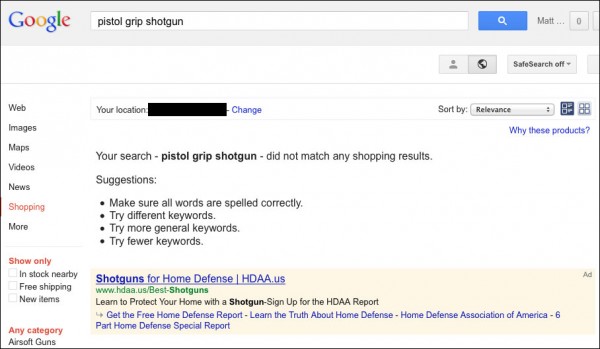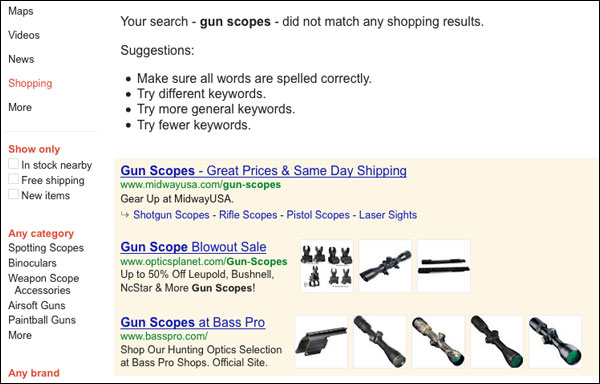Google Bans Weapon-Related Listings From Google Shopping
Google has begun notifying merchants that it won’t allow them to continue to listing weapons-related items for sale in Google Shopping. Searches in Google Shopping for things like “pistol grip shotgun” (above), “gun scopes,” “shotgun shells” and many other terms are leading to a results page that says the term “did not match any shopping […]
Google has begun notifying merchants that it won’t allow them to continue to listing weapons-related items for sale in Google Shopping.
Searches in Google Shopping for things like “pistol grip shotgun” (above), “gun scopes,” “shotgun shells” and many other terms are leading to a results page that says the term “did not match any shopping results.”
Outdoor Hub broke the news late last week, and linked to an online petition that includes a copy of the letter that Google has sent to affected merchants.
The letter says that Google will “begin to enforce a set of new policies for Google Shopping in the coming weeks,” and links to a Google Shopping policies page that lists “guns, ammunition and knives” as prohibited products.
Google: We’re Applying AdWords Rules To Shopping
A Google spokesperson tells Search Engine Land — and the letter to merchants also mentions — that the company is applying its existing Google AdWords policies to the new Google Shopping experience, which recently switched to a pay-for-inclusion model. The AdWords support area has a page detailing weapons-related policies that now apply to Google Shopping, since it’s now an ad-based service.
But the rules inside Google Shopping Search appear to be stricter than they are for AdWords. That Shopping Search help page specifically says that “guns, ammunition and knives” are prohibited in Google Shopping. But the AdWords help page has a more detailed and nuanced list of what’s allowed and what’s not when it comes to weapon-related ads.
This is shown pretty clearly in a Google Shopping search for “gun scopes.” There are no shopping results, but there are AdWords ads.
Further complicating the issue is that searching on Google.com for these now-banned Shopping Search items often brings up a Shopping Search product box in the upper right that promotes the new Google Shopping Search and links to it with the encouragement for shoppers to “see more shopping results.”
What About The Second Amendment?
Mentioned in some of the discussion about Google’s ban on weapons in Shopping Search is the fact that the second amendment to the U.S. Constitution gives citizens the right to “keep and bear arms,” and that this new policy appears to be an attack on a basic right. (Though it should also be noted that Google bans vehicles from being listed in Shopping Search, too, and that doesn’t seem to be an attack on anyone’s right to own a car.)
What has some up in arms is a four-point set of “policy principles” that Google included in its letter to weapon-related merchants and, more specifically, the fourth point on that list, which reads as follows:
4) Google Shopping should be compatible with Google’s brand decisions.
Google Shopping must be compatible with company brand decisions. Our company has a strong culture and values, and we’ve chosen not to allow ads that promote products and services that are incompatible with these values. In addition, like all companies, Google sometimes makes decisions based on technical limitations, resource constraints, or requirements from our business partners. Our policies reflect these realities.
Since most guns and related products are legal in the U.S., it’s that principle that seems to be behind Google’s decision not to allow such items to be included in Shopping Search.
I’m not a lawyer, but it certainly seems to be within Google’s rights to decide what advertisers can and can’t peddle on Google Shopping. But it also seems like a slippery slope to use vague terms like “culture and values” to determine who can and can’t list products in Shopping Search — a slope that’s likely to open Google up to further criticism if it continues to apply that principle to other industries.
Contributing authors are invited to create content for Search Engine Land and are chosen for their expertise and contribution to the search community. Our contributors work under the oversight of the editorial staff and contributions are checked for quality and relevance to our readers. The opinions they express are their own.
Related stories
New on Search Engine Land


